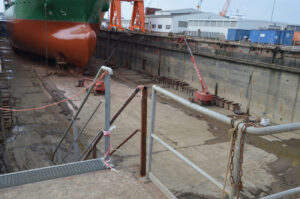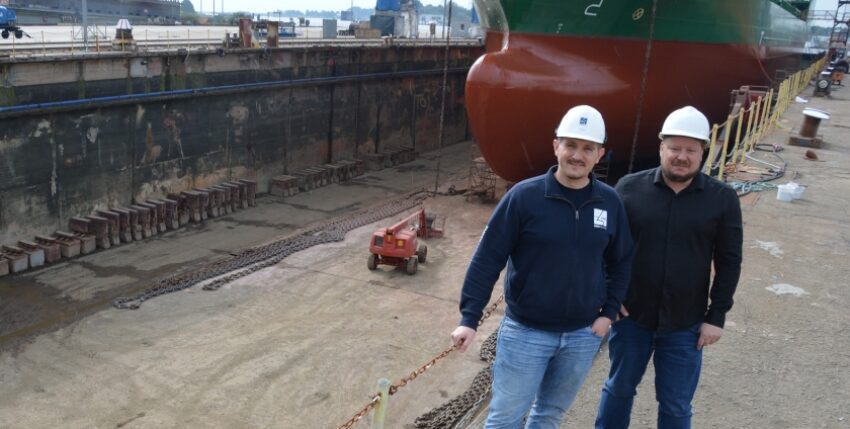Increasing environmental protection requirements could make the recycling of ships lucrative again in Germany. In Emden, EWD wants to benefit from this development.
Yachts, submarines, research vessels, cruise liners: German shipyards build the most diverse and sophisticated ships. They also rebuild, repair and maintain them. However, there is a lack of companies that dismantle old ships. Ship recycling is currently largely "non-existent" in Germany, explains Reinhard Lüken from the German Shipbuilding and Ocean Industries Association. The European Union has a list of companies that are authorised to recycle certain EU-flagged ships - however, there is no entry from Germany, but there are from Denmark, the Netherlands and Turkey, for example.

to be scrapped, photo: Phillipp Steiner
The majority of the world's tonnage continues to be scrapped in South Asia. Wages and disposal costs play a major role in this," explains Karin Logemann, who is a member of the Lower Saxony state parliament's subcommittee for ports and shipping. However, she sees signs of change: "In the course of a global rethink towards a more circular economy and recycling, the picture is changing: scrap steel is highly interesting for the local industry," says the SPD politician from Wesermarsch. In addition, the Hong Kong Convention will come into force in 2025. From June, the international convention will stipulate standards for environmental protection and occupational safety when scrapping ships. "The convention will cause prices to skyrocket in places where ships have previously been scrapped under undignified and dangerous conditions."
Making labour in Asia more expensive could improve the position of Germany as a high-wage country. And this against the backdrop of global demand for recycling capacities. Susanne Neumann from the Maritime Cluster Northern Germany says: "A historic high in recycling activities is expected in the shipping industry in the coming years due to new emission targets." Although the wave could be delayed due to geopolitical conditions, it will be all the more intense afterwards. "Accordingly, the business environment for new recycling yards is very positive."
In Emden, a new company is waiting in the wings: Emder Werft und Dock (EWD). The traditional company, which now belongs to the Bremerhaven-based Benli Group, specialises in conversions, retrofits, repairs and smaller new builds. For ship recycling, it has teamed up with the company Relog, owned by recycling specialist Sebastian Jeanvré. Relog offers, for example, the dismantling of steel buildings and lifts. Umweltkanzlei Beratungs- und Prüfungsgesellschaft, of which Jeanvré is also Managing Director, takes care of the authorisations.
In future, ships are to be dismantled in Emden, explained Jeanvré, shipyard manager Björn Sommer and project manager Franek Kalms from EWD during a site visit. Jeanvré outlines the planned process: The ship will be freed of pollutants at the pier and then taken to the dry dock. Workers use cutting torches to cut it into elements weighing around 20 tonnes, which the dock cranes can lift easily. The steel is further crushed on the heavy-duty area next door. Barges then transport the steel via waterways such as the Mittelland Canal to steelworks in Salzgitter or Bremen.
In addition to steel, ships can contain other valuable raw materials such as aluminium and copper. And problematic and hazardous substances such as lead, bilge oil, asbestos and toxic hull coatings. This can involve a great deal of effort. If asbestos is found, for example, the ship has to be enclosed and pressurised before it can be removed, explains Jeanvré. The removal of the pollutants forms the "cost block", the recyclable materials bring a "credit note", as the expert puts it. The ratio determines whether the customer has to pay for scrapping or still receives money for their old ship.

and Dock GmbH, Photo: Phillipp Steiner
The shipyard benefits from the fact that it is already familiar with much or all of the work and materials that would be involved in recycling, as EWD boss Sommer explains: "We have done everything. After all, the normal procedure for a ship repair is to repair damage and completely dismantle a ship. You really do handle all the substances and pollutants that are present in a ship."
They also want to utilise the existing space for recycling. Ideally, the scrap ship would be dismantled in the dry dock while another ship is being worked on at the same time. Recycling would therefore take place at the point in the dock where there is an estimated 80 metres in length between the red bulbous bow of a container freighter and the end of the dock.
Accordingly, no ocean liners are to be dismantled in Emden. Coastal vessels, inland vessels and feeder ships are exciting for the business, says Jeanvré. Supply ships for wind farms are a growing segment. "We can go up to 240 metres and 40 metres wide. But we would only utilise the maximum in special cases." It's not just about ships in the narrower sense, but also about barges, pontoons and even offshore wind turbines. First and foremost, however, Jeanvré mentions "state vessels, naval vessels, government vessels - we can do all of that under the German flag". No notification procedure is needed for this.
The shipyard also has to take care of authorisations. A central set of regulations is the Federal Immission Control Act and its ordinances. Until now, the shipyard has been authorised to build and repair ships, explains Jeanvré. Now complete recycling must be authorised. In addition, the shipyard wants to be certified as a specialised waste management company in order to be allowed to continue handling the materials from the ship - so that, at best, sheet metal or so-called semi-finished products for shipbuilding can be produced again. It also wants to be certified in accordance with the EU Ship Recycling Regulation, which stipulates standards for the scrapping of EU-flagged ships of 500 GT or more.
Just in case, says Jeanvré. He also praises the cooperation with the authorities and the support from politicians. If everything goes according to plan, Emden should be ready to go in the second quarter of 2025. More than ten enquiries from shipping companies have already been received.
Phillipp Steiner







